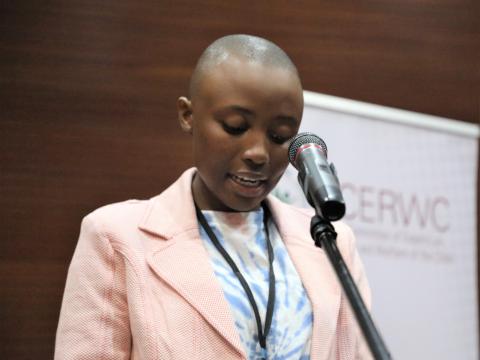World Vision Lesotho child representative's call on the safety and protection of the rights of children

Official opening remarks by : Makeletso Mothakathi | World Vision Lesotho Child Representative
Welcome to the mountain kingdom Lesotho. My name is Makeletso Mothakathi and on behalf of the Government of Lesotho, the Children, and the people of Lesotho, I greet all the delegates from the African Union member states assembled here today.
This conference is an impressive testimonial to the devotion and dedication of the African Union in upholding the protection of children’s rights. This event is indeed momentous and remarkable for Children in Lesotho and across the whole of Africa.
Ladies and Gentlemen, The Children in Africa face many challenges including hunger, diseases, wars, harmful cultural practices such as child marriages, female mutilation, and many more, and the bottom line is that: Children in Africa are particularly vulnerable and suffering. They suffer from malnutrition, drop out of school for various reasons and therefore have no prospects of a better future. Studies indicate that many of African children do not even experience their fifth birthday as result of ill-health.
However, for this conference, I would like to ask us as children, all African countries represented here and the development partners, to deliberate more on the recently emerging and trending issues facing children.
First, the protection of children online or children using the internet. Children are spending more time online than ever before and this puts them at higher risk of violence, online sexual exploitation, child trafficking and abuse on the internet. We appreciate countries that are making efforts to have laws and policies in place that protect children online, while we urge all other African countries to have laws that protect children online.
The second issue is drug and alcohol abuse amongst children. According to the latest World Health Organization data published in 2020, deaths related to drug use in Lesotho reached 32 or 0.10% of total deaths. The age adjusted death rate is 1.67 per 100,000 of the population and Lesotho is ranked number 61 in the world. According to Article 28 of the African Charter on the rights and welfare of the Child, every child has the right to protection from harmful drugs and the drug trade. Therefore, governments should protect all children from having to take part in making, selling, moving or using drugs.
Thirdly, child trafficking; children trafficked in countries ravaged with war and conflicts in Africa are often sold as slave laborers, domestic servants or sex slaves. In Lesotho, we see parents and caregivers as the initiators of child trafficking, due to poverty there is high rate of illegal migration to South Africa putting children at risk of being trafficked.
Ladies and Gentlemen, I cannot leave this stage without mentioning the rights of children with special needs; in your plans as African countries and development partners, please consider inclusive education and access to services for children with disabilities.
Governments have an obligation to protect children in all these issues highlighted. The governments should have laws that protect children from harmful practices, drug and alcohol abuse, protection of children online and child trafficking. In so doing, they should ensure that no child is discriminated or left behind, and all African Children’s rights are protected.
Lastly, let me appreciate platforms like this that give children an opportunity to participate and have a voice on issues that affect us as children. Child participation is very important to us as children because we want to be heard. This is why as children we encourage all governments to have the children’s parliament in place for all African countries.
The hosting of the Children’s Parliament creates a platform for children’s participation in democracy and provides them an opportunity to influence policies as well as programmes and strategies intended to realize their rights. As the saying goes “Nothing for us without us”.
KHOTSO PULA NALA